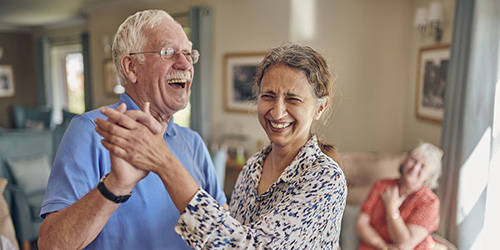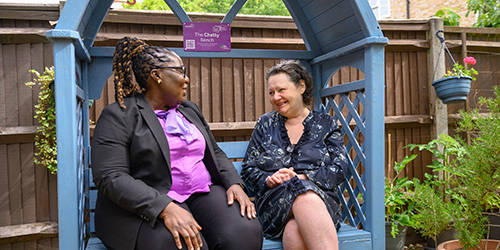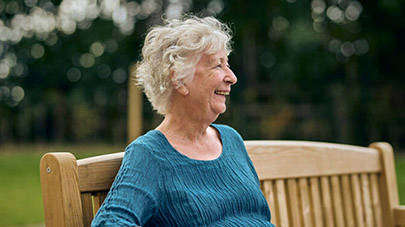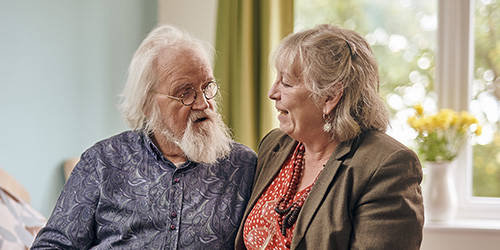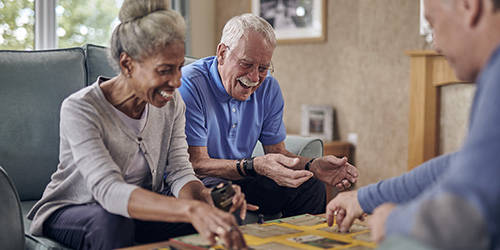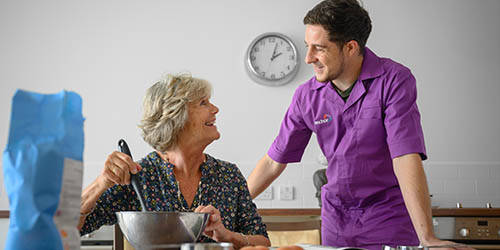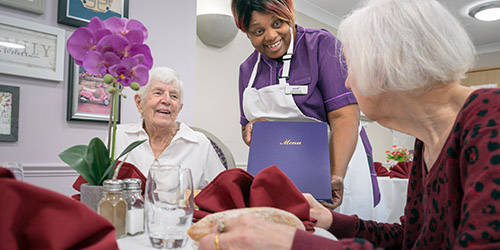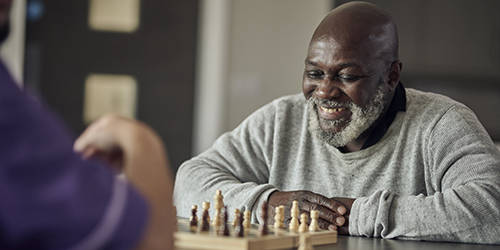- Home
- Guides & support
- Activities for people living with dementia
Last reviewed 16 December 2025
Activities for people living with dementia
People living with dementia should have access to a wide range of carefully considered and meaningful things to do that reflect and support their hobbies, personal interests and life experiences.
This might include group activities, one-to-one engagement, or being supported with self-engagement if this is something they would enjoy.
By focussing on a person’s likes, dislikes and what makes them happy you can plan activities that the person will enjoy and find stimulating. It could be that the person used to dance when they were younger, so taking them to a dance show or competition, or watching or talking about dancing could be entertaining.
Perhaps they used to work as a chef and would enjoy a trip to a favourite restaurant or cooking a favourite meal with support. It’s important to make sure the activity is something that the person can be active in, to ensure they don’t feel like they can no longer take part in that favourite hobby or interest.
At Anchor, we see every interaction as an opportunity to actively engage with our residents, conversations about memories and experiences all add to our understanding of the individual; their likes, dislikes, the funny or exciting memories they may want to share help us get to know the person they are better.
The use of Life Stories
At Anchor, we encourage our residents to create their Life Story. This could take the form of a photo album, a scrapbook or a memory box. Developing Life Stories for people living with dementia enables the people caring for them to understand more about their personality, feelings, loved ones, experiences and future aspirations, along with topics that may make the person sad or upset. This helps support with daily tasks, reminiscence and reassurance. It’s important to add to a Life Story on an ongoing basis to reflect things learnt and new experiences.
Research shows that Life Stories have a positive influence on people living with dementia, their relatives, and staff in care homes.
Create a memory box
 Memory boxes help people living with dementia to recall fond memories of people and events from the past. These boxes are specially designed to help conjure up memories that can get a conversation started and stimulate happy emotions. Memory boxes are most effective when they’re filled with personal items that have significant meaning to the individual.
Memory boxes help people living with dementia to recall fond memories of people and events from the past. These boxes are specially designed to help conjure up memories that can get a conversation started and stimulate happy emotions. Memory boxes are most effective when they’re filled with personal items that have significant meaning to the individual.
We encourage everyone at our care homes to have a memory box, and recommend that these are filled with:
- Items that have a strong connection to a memory, for example holiday souvenirs or a photo of a wedding or special family occasion
- Captions that explain each item clearly, to further prompt memories and conversation
- A variety of items, from ornaments to artwork, news clippings to music tapes
- Items that engage different senses with different materials, smells, sounds and colours. In some cases it’s best to avoid anything sharp, heavy, or difficult to handle
Not only can memory boxes help the person living with dementia, but research has found that in care homes the use of memory boxes can help improve staff knowledge and understanding of the people they support.
Put on your dancing shoes
Dancing is beneficial for both physical and mental wellbeing, providing a feel-good factor for everyone even if they are simply watching others having fun.
Anchor’s research with the Beth Johnson Foundation has shown how creative activities, like dance, drama and music, can soothe, stimulate and engage underused but still active areas of the brain. There are plenty of dancing and acting videos online to make the most of. Dancing doesn’t have to be strenuous, introducing ‘chair dancing’ is a fantastic way of exercising while remaining safe.
Embrace the power of music
The transformative power of music is amazing. It can help people recall certain memories, transporting people back to a favourite place and time and reconnecting them with loved ones.
Whether listening to big band classics, rock music or relaxing country songs, music has the power to help relieve the anxiety, stress and agitation sometimes felt by people living with dementia. It could also reduce heart rate and blood pressure and help to manage pain.
It’s important to find ways to have fun when living with dementia and incorporating music that the individual enjoys can be a great way to do that. A playful and active approach to dementia care can help with emotional stability and the development of trust. This could be listening to music, watching a musical, singing, or even playing instruments.
 Make the most of technology
Make the most of technology
At Anchor we’ve seen first-hand the benefits of using technology to bring people together and engage people living with dementia. Electronic tablets can provide access to lots of information, pictures, music, and films to help calm and engage people living with dementia. We use tablets to connect with all residents, tailoring activities such as bingo and photo galleries to suit people’s own interests and life experiences.
Virtual reality can also be used to support some people living with dementia to reminisce, but might not be suitable for everyone. You can download virtual reality apps on tablets/phones that allow people to be transported back to bygone days. Virtual reality headsets for these can be bought quite easily online.
Dementia care at Anchor
We recognise all of our residents as individuals and create a personalised care plan to ensure we focus on the person, not their diagnosis. Our care homes offer specialised dementia care with dedicated teams and personalised support. Learn more about our dementia care and how we take a person-centred approach.
Related information about dementia
This website uses cookies which track activity so that you get the best possible experience. By continuing to use this website we will assume you are happy and cookies will be set. You can change your cookie settings at any time.


